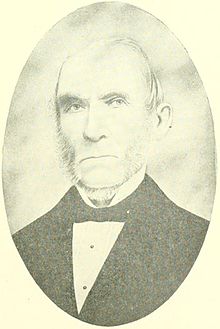Ryland Fletcher
| Ryland Fletcher | |
|---|---|

From Volume 2 of 1911's "History of Norwich University, 1819-1911".
|
|
| 24th Governor of Vermont | |
|
In office October 10, 1856 – October 10, 1858 |
|
| Lieutenant | James M. Slade |
| Preceded by | Stephen Royce |
| Succeeded by | Hiland Hall |
| 19th Lieutenant Governor of Vermont | |
|
In office October 13, 1854 – October 10, 1856 |
|
| Governor | Stephen Royce |
| Preceded by | Jefferson P. Kidder |
| Succeeded by | James M. Slade |
| Member of the Vermont House of Representatives | |
|
In office 1861–1864 |
|
| Personal details | |
| Born | February 18, 1799 Cavendish, Vermont |
| Died | December 19, 1885 (aged 86) Proctorsville, Vermont (in Cavendish, Vermont) |
| Political party | Republican |
| Spouse(s) | Mary May |
| Children | Henry Addison Fletcher |
| Profession | farmer, politician |
Ryland Fletcher (February 18, 1799 – December 19, 1885) was an American farmer, politician, the 19th Lieutenant Governor of Vermont from 1854 to 1856, and then was the 24th Governor of Vermont from October 10, 1856 to October 10, 1858.
Fletcher was born in Cavendish, Vermont, and in his early years he worked on his father's farm. He attended Norwich University, from which he graduated in 1824 and taught in a local school during the winter months. He married Mary May on June 11, 1829, and they had three children. He was the brother of United States Representative Richard Fletcher and Horace Fletcher; and the father of Col. Henry Addison Fletcher, who served in the Civil War, a state senator, and Lieutenant Governor of Vermont.
When Fletcher was eighteen, he became a member of the Vermont state militia, where he attained the rank of Brigadier General in 1835. He was a noted anti-slavery and temperance advocate who served in the Vermont State Senate, and he became a Republican when the party was founded in the 1850s.
In 1854, Fletcher was the nominee of the Whig, Free Soil, and Liberty Parties, and won the election as Lieutenant Governor of Vermont. Nominated by the newly formed Republican Party, he was re-elected in 1855. He was a strong proponent of biennial rather than annual gubernatorial elections and was a tireless worker for the anti-slavery and temperance causes. After the State House burned down in an 1857 fire, he called a special legislative session to plan for rebuilding. In 1858, he called the first muster and training of the Vermont militia since the Mexican War. That training proved useful at the start of the Civil War.
...
Wikipedia
